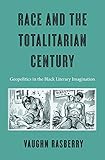Race and the Totalitarian Century : Geopolitics in the Black Literary Imagination / Vaughn Rasberry.
Material type: TextPublisher: Cambridge, MA : Harvard University Press, [2017]Copyright date: ©2016Description: 1 online resource (410 p.) : 4 halftonesContent type:
TextPublisher: Cambridge, MA : Harvard University Press, [2017]Copyright date: ©2016Description: 1 online resource (410 p.) : 4 halftonesContent type: - 9780674973015
- African American authors -- Political activity -- History -- 20th century
- African Americans -- Politics and government -- Philosophy
- Geopolitics in literature
- Politics and literature -- United States -- History -- 20th century
- Racism -- History -- 20th century
- Totalitarianism and literature
- LITERARY CRITICISM / American / African-American
- 323.1196/073 23
- E185.6 .R36 2016
- online - DeGruyter
| Item type | Current library | Call number | URL | Status | Notes | Barcode | |
|---|---|---|---|---|---|---|---|
 eBook
eBook
|
Biblioteca "Angelicum" Pont. Univ. S.Tommaso d'Aquino Nuvola online | online - DeGruyter (Browse shelf(Opens below)) | Online access | Not for loan (Accesso limitato) | Accesso per gli utenti autorizzati / Access for authorized users | (dgr)9780674973015 |
Frontmatter -- Contents -- Introduction -- Part One: Race and the Totalitarian Century -- 1. The Figure of the Negro Soldier -- 2. Our Totalitarian Critics: Desegregation, Decolonization, and the Cold War -- 3. The Twilight of Empire: The Suez Canal Crisis of 1956 and the Black Public Sphere -- Part Two: How to Build Socialist Modernity in the Third World -- 4. The Right to Fail: W. E. B. Du Bois and the Communist Hypothesis -- 5. From Nkrumah’s Ghana to Nasser’s Egypt: Shirley Graham as Partisan -- 6. Bandung or Barbarism: Richard Wright on Terror in Freedom -- Conclusion: Memory and Paranoia -- Notes -- Acknowledgments -- Index
restricted access online access with authorization star
http://purl.org/coar/access_right/c_16ec
Few concepts evoke the twentieth century’s record of war, genocide, repression, and extremism more powerfully than the idea of totalitarianism. Today, studies of the subject are usually confined to discussions of Europe’s collapse in World War II or to comparisons between the Soviet Union and Nazi Germany. In Race and the Totalitarian Century, Vaughn Rasberry parts ways with both proponents and detractors of these normative conceptions in order to tell the strikingly different story of how black American writers manipulated the geopolitical rhetoric of their time. During World War II and the Cold War, the United States government conscripted African Americans into the fight against Nazism and Stalinism. An array of black writers, however, deflected the appeals of liberalism and its antitotalitarian propaganda in the service of decolonization. Richard Wright, W. E. B. Du Bois, Shirley Graham, C. L. R. James, John A. Williams, and others remained skeptical that totalitarian servitude and democratic liberty stood in stark opposition. Their skepticism allowed them to formulate an independent perspective that reimagined the antifascist, anticommunist narrative through the lens of racial injustice, with the United States as a tyrannical force in the Third World but also as an ironic agent of Asian and African independence. Bringing a new interpretation to events such as the Bandung Conference of 1955 and the Suez Canal Crisis of 1956, Rasberry’s bird’s-eye view of black culture and politics offers an alternative history of the totalitarian century.
Mode of access: Internet via World Wide Web.
In English.
Description based on online resource; title from PDF title page (publisher's Web site, viewed 24. Aug 2021)


